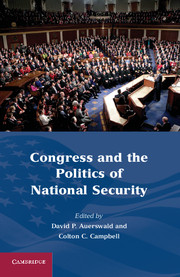10 - National Security Surveillance
from Part Three - Policy Challenges: Contours of Debate
Published online by Cambridge University Press: 05 June 2012
Summary
Presidential authority to engage in national security surveillance has been shaped by executive initiatives, congressional statutes, and judicial decisions. After the terrorist attacks of 9/11, the Bush administration decided to authorize warrantless national security surveillance in violation of the Foreign Intelligence Surveillance Act (FISA). The operation remained secret until disclosed by the New York Times in December 2005. Pressured by the administration, Congress passed legislation in 2008 to give retroactive immunity to the telecoms that assisted with the surveillance. In so doing, Congress gave a green light to executive agencies and private companies that act against the law. In defense, administration officials claimed that the president has certain “inherent” powers under Article II of the Constitution that may not be limited by congressional statutes or judicial rulings. Efforts to challenge the Bush surveillance policy in court have been difficult because federal judges are reluctant to dispute national security claims by the executive branch, especially when private parties seek access to information the government regards as “state secrets.”
Some Early Precedents
On May 21, 1940, on the eve of World War II, President Franklin D. Roosevelt sent a confidential memo to Attorney General Robert H. Jackson, authorizing and directing him to obtain information “by listening devices” to monitor the conversations or other communications “of persons suspected of subversive activities against the Government of the United States, including suspected spies.” Roosevelt told Jackson to keep these investigations “to a minimum and to limit them in so far as possible to aliens” (Fisher and Harriger 2011, 740). No specific law in 1940 prohibited Roosevelt from taking this initiative.
- Type
- Chapter
- Information
- Congress and the Politics of National Security , pp. 213 - 230Publisher: Cambridge University PressPrint publication year: 2011



